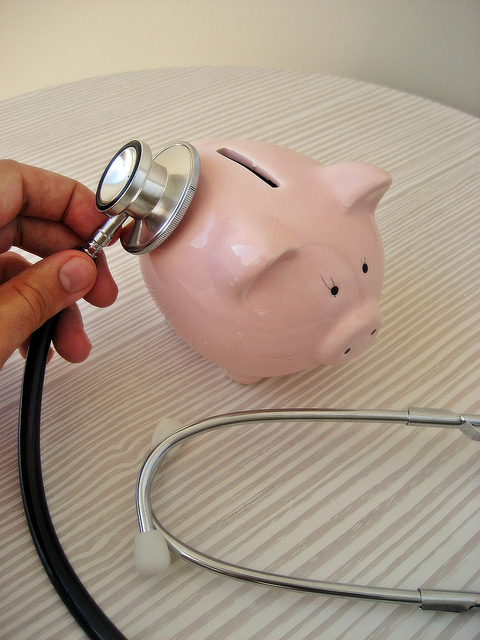A year and a half ago, I turned 26.
I was living on a small island in the British Columbian wilderness, and it was it was pretty low key. But as I cracked a beer and looked out over the ocean, a small tendril of doubt and uncertainty nibbled away in the back of my mind: the final step to adulthood was complete—and isolated as I was, I couldn’t help but feel exposed and vulnerable.
No longer would I be allowed to ride the coattails of Mom and Dad’s health care plan. As I was (and am) little more than a tramping, hopeless wanderer, the odds of me finding a job that would offer a health care plan was virtually zero.
I write this because, for the first time since my 26th birthday, I have healthcare, thanks to Alaska’s expanded medicaid program.
For those of you that aren’t American citizens, you probably just shrugged your shoulders and thought: so what? If you live in a developed country, you’re virtually guaranteed to have national healthcare. Among the exceptions are a few struggling Baltic countries, and America.
In the richest country in the world, sorting through health care plans is still a giant headache. It’s a labyrinth of co-pays, coverage plans, and deductibles. And that’s without even getting into the Affordable Care Act whose website coldly informed me that I made too little money to qualify for financial help…
I’m not out to “game” the system. I’ve never collected unemployment, or food stamps, or taken advantage of any other program except Alaska’s Permanent Fund Dividend. It’s ironic how vocal many Alaskans are against “free” programs until someone suggests that we dip into our precious oil money to help get the state out of debt.
It’s one of the reasons I’m pulling for Bernie Sanders. Because I’m not convinced that my indebted state won’t pull the Medicaid rug out from under my feet at some point. And while many that oppose universal healthcare point to the increased financial toll on the federal budget, the American government already pays more per capita on healthcare than nearly everyone else, including those countries with universal programs.
This revelation made me stop asking “why” and start asking “how.”
How can our government still be dolling out more than Canada despite our lack of federal funding?
The fault lies not just with bureaucratic inefficiencies, or unregulated drug prices, but with us. We have not just a healthcare crisis, but a health crisis. America has one of the highest obesity rates in the world, crippling not just adults but children too. “Obesity is the number-one health problem facing young Americans,” says Tom Peterson, a pediatrician in Michigan.
The numbers seem to support this. Obesity is a precursor to diabetes, and though 8-9% of adults are diabetic, up to a third of children today are projected to be diagnosed as diabetic at some point (Easterbrook, 2013). This is not just an epidemic, but a massive strain on a federal government. Combined private and public spending on our health tipped the scales at $8,233 dollars per person in 2010. What will that number be like in twenty years if nearly a third of the nation needs insulin or other diabetic medication?
Everyone deserves the right to healthcare. No one should ever have to decide between declaring bankruptcy and good health. And while expanding programs to those that don’t qualify is a good step, it feels like plugging a leaking dam that’s ready to burst.
To really get a handle on the cost of medical care, we need to trace the root of the problem back to its cause, our national eating disorder. A disorder we need to change immediately. This goes beyond a few PSA’s telling us to eat right and exercise, or the NFL’s “community cares” commercials encouraging kids to run around for an hour a day. Seriously, we need to tell our kids to run around? We’re becoming sedentary.
Our lives dominated by electronics and our couches, the food we’re eating while we sit full of the very things that expand our waistlines, sweeten our blood, and send us to the doctor.
Perhaps it starts with something as simple as Michael Pollan’s credo: Eat food. Not too much. Mostly plants. But this means changing the way we grow, produce, and sell food. It means we stop eating cheap meat stuffed with antibiotics three times a day. That we try to break our addiction to a substance more addicting than cocaine. Because if we can start eating better, start taking care of ourselves, our demand for medical attention will decrease, the strain on the system will lesson, and the price of healthcare will fall.
It’s asking a lot.
Meat, sugar, and fats have become pillars in our food chain, supported in many cases by our corn and soy surpluses propped up by subsidies. Which leads to the bigger challenge, asking our government to lead the charge toward better health and better living.
But to truly save ourselves, and by extension, our world, we need to talk not just about healthcare reform in the upcoming election, but health reform entirely.
Reference:
Easterbrook, Gregg. “How 307 Pounds Became Undersized.” The King of Sports: Football’s Impact on America. New York: St. Martin’s, 2013. 184-87. Print.
Author: David Cannamore
Editor: Renée Picard
Image: 401(K) 2012 at Flickr











Read 4 comments and reply